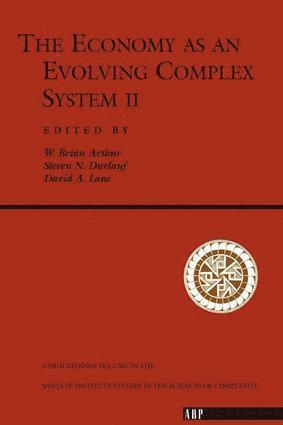
- Format
- Häftad (Trade paperback)
- Språk
- Engelska
- Antal sidor
- 608
- Utgivningsdatum
- 1997-10-06
- Förlag
- Taylor & Francis Inc
- Medarbetare
- Durlauf, Steven N (red.) / Arthur, W. Brian (red.)
- Dimensioner
- 231 x 155 x 35 mm
- Vikt
- ISBN
- 9780201328233
- 880 g
Economy As An Evolving Complex System II
- Skickas från oss inom 7-10 vardagar.
- Fri frakt över 249 kr för privatkunder i Sverige.
Passar bra ihop
De som köpt den här boken har ofta också köpt Braiding Sweetgrass av Robin Wall Kimmerer (häftad).
Köp båda 2 för 1205 krKundrecensioner
Fler böcker av författarna
-
Nature of Technology
W Brian Arthur, W Brian Arthur, W Brian Arthur
-
Behavioural and Experimental Economics
Steven Durlauf, L Blume, Steven N Durlauf, Lawrence E Blume
-
Microeconometrics
Steven Durlauf, L Blume, Steven N Durlauf, Lawrence E Blume
-
Economic Growth
Steven Durlauf, L Blume, Steven N Durlauf, Lawrence E Blume
Övrig information
W. Brian Arthur is a Citibank Professor at the Santa Fe Institute. From 1983 to 1996 he was Dean and Virginia Morrison Professor of Population Studies and Economics at Stanford University. Arthur has been associated with the Santa Fe Institute since 1987 he directed its first program: the economy as an evolving, complex system. He currently serves on SFI's science board and its board of trustees and is well known in economics for his work on increasing return and path dependence. Steven N. Durlauf is professor of economics at the University of Wisconsin at Madison and since 1996 co-director of the economics program at the Santa Fe Institute. He received his B.A. in economics from Harvard in 1980 and his Ph.D. in economics from Yale in 1986. He has published widely in the areas of macroeconomics, econometrics, and income inequality. David A. Lane is professor of statistics in the Faculty of Economics at the University of Modena in Italy. He is a member of the external faculty and the science board of the Santa Fe Institute and is a past co-director of the Institute's economics program. W. Brian Arthur is a Citibank Professor at the Santa Fe Institute. From 1983 to 1996 he was Dean and Virginia Morrison Professor of Population Studies and Economics at Stanford University. Arthur has been associated with the Santa Fe Institute since 1987 he directed its first program: the economy as an evolving, complex system. He currently serves on SFI's science board and its board of trustees and is well known in economics for his work on increasing return and path dependence. Steven N. Durlauf is professor of economics at the University of Wisconsin at Madison and since 1996 co-director of the economics program at the Santa Fe Institute. He received his B.A. in economics from Harvard in 1980 and his Ph.D. in economics from Yale in 1986. He has published widely in the areas of macroeconomics, econometrics, and income inequality. David A. Lane is professor of statistics in the Faculty of Economics at the University of Modena in Italy. He is a member of the external faculty and the science board of the Santa Fe Institute and is a past co-director of the Institute's economics program.
Du kanske gillar
-
Orbital
Samantha Harvey
Häftad -
Empire of AI
Karen Hao
Inbunden -
Matrescence
Lucy Jones
Häftad


